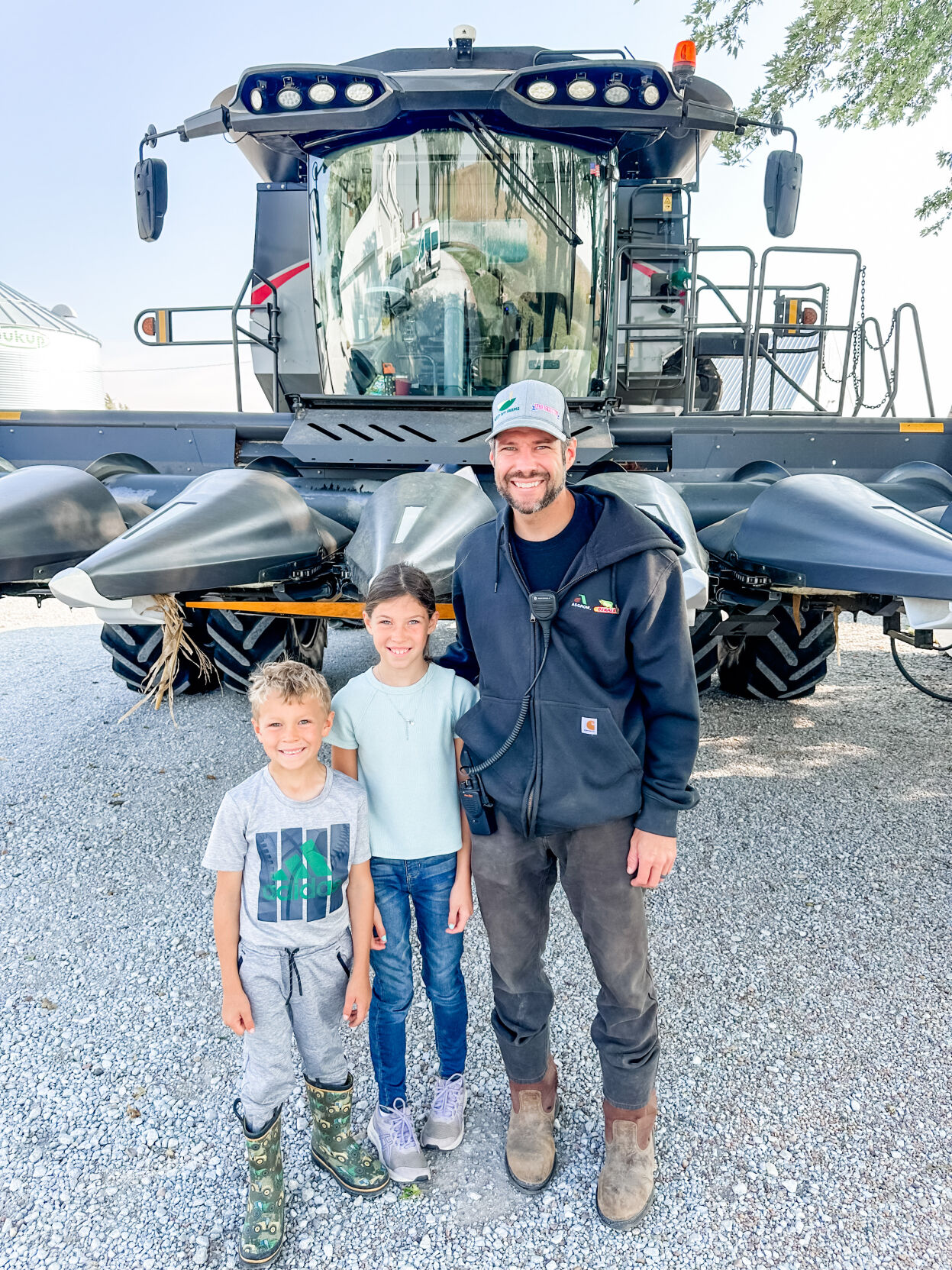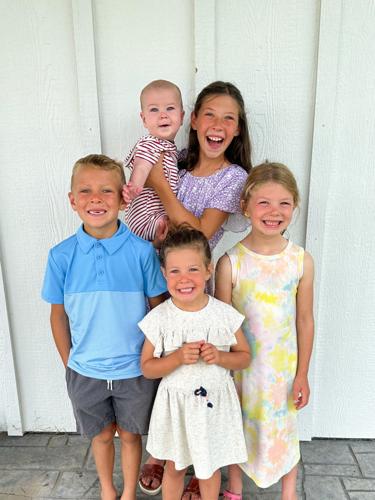It was the late 1980s in Sutton, Nebraska, and Caleb Fintel’s family purchased their first computer and brought it home to their dryland farm. Caleb was inspired.
However, as much as he became passionate about building computers, years later, Caleb is far more enthusiastic about building soil.
Today, Caleb and his wife Jordan farm just outside Sutton. With their five children – Jocelyn, Sully, Poppy, Sylvie and Hugh, the Fintels are proud farmers, but even prouder parents. On their farm, they are implementing conservation practices for the next generation that use measurably less synthetic chemical inputs.
Their approach to what is now labeled as “regenerative agriculture,” is leading to a better return on their farm investment and a healthier landscape for their family and the community.

Caleb and his wife Jordan, with their five children Jocelyn, Sully, Poppy, Sylvie and Hugh, farm just outside Sutton, Neb. They are focused on building the soil for the next generation.
“I became interested in computers early on. I always liked taking stuff apart and putting stuff together,” Caleb said.
In junior high, his parents, Ivan and Cyndee, let him start buying components for computers so he could put them together himself.
“I think younger generations develop a keen understanding of what the next, big, up and coming thing is going to be. For me, it was computers,” he said.
The machines solved a bunch of problems for him, he said. A self-labeled “bad speller,” he could use a program to correct his spelling that helped in school. He also struggled to learn the conventional way. Building computers was another way for him to learn.
Caleb didn’t just stick to building and maintaining computers for his family. Word got out, and he was soon helping neighbors, and even was contracted by Ag West Commodities in Sutton to help set up some IT (information technology) infrastructure. While he was excelling at electronics, he was also helping his parents run the farm.
When he was growing up, they raised cattle, oats, sorghum and wheat. The all dryland farm near Highway 41 was surrounded by irrigated acres.
“It was a different approach for us,” he said.
He was actively involved with the farm, but like a lot of young people, he wondered what else was out there and if farming was really what he wanted to do as a career.
“I knew I wanted to go to college, and I saw so many of the struggles with farming being weather dependent and other challenges. I just didn’t see the sustainability of it,” he said.
Caleb headed to Midland Lutheran College, now Midland University in Fremont where he majored in business administration with a minor in marketing. He also became interested in astronomy because of a great professor in the science department.
“That also led me to take every astronomy class I could,” he said.
As a senior at Midland, he ran the observatory located on a rooftop and learned he really enjoyed telescopes.
While Caleb was studying the stars and dreaming of becoming an entrepreneur one day, his future wife, Jordan, was entering the college as a freshman. He knew of her but they didn’t formally meet until he started working at Hewlett Packard.

The Fintel children, Jocelyn, Sully, Poppy, Sylvie and Hugh, are still young. When they’re older, the family hopes to add livestock to their operation.
“God worked it all out,” Jordan said. “One day, Caleb showed up at Bethany Lutheran Church in Elkhorn, Nebraska, and he didn’t know who to sit by, so I let him sit by me. We were in a singles group at church together for five years. He tried to date me the whole time and I said no the whole time.”
On Nov. 5, 2011, the couple married. After they had been married a year, on their way home from an anniversary trip, they had a voicemail from Caleb’s dad. It was a once-in-a-lifetime opportunity. There was land coming up for rent near their home farm and if Caleb wanted to pursue his dreams of being a farm entrepreneur, he had better seize the day.
Once more, Jordan said, God worked it all out. Caleb’s grandpa had been living in a house in Sutton and had passed away. His dad had put the house on the market, but it never sold. So, they bought the home from his parents.
For two years, the young couple worked full time in Omaha. Jordan was employed at Woodhouse Ford and Caleb was at Hewlett Packard in the finance department. They commuted from Sutton, farmed full time, remodeled a home and saved money.
When it came to farming, Caleb and Jordan kept their farm completely separate from Ivan and Cyndee. They shared equipment, but that was it.
“Dad did two things right away. He took me to Ag West Commodities and said, ‘you are going to have to have a marketing plan for your crops.’ And the second thing he did was advise me to set up my financing through Farm Credit.
“We started from scratch, except for the equipment sharing, which of course was a huge help. That was the only way we could have started,” Caleb said. “My parents really did a smart thing in keeping the farms separate.”
Farming the rented land meant the world was the young couple’s oyster when it came to trying new things.
“From the very beginning, we had a full stake in the farm management,” he said. “We were told we could manage it differently than my parents and that we would either reap the rewards or have struggles.”
That was his key to developing an understanding of the commodity and marketing side of farming that he still enjoys today.
The other side of farming that Caleb really got excited about was inputs and agronomy.
“I was always trying to better understand what actually makes a plant grow,” he said.
Without a background in agronomy, he started fresh.
“The good thing was I didn’t have to unlearn anything that maybe isn’t always taught correctly,” he said.
Caleb said his interest in soil health ramped up when he was connected with Nature’s Formula, a company out of Brownsboro, Texas, recommended by his uncle who is a microbiologist. He liked their products so much that he sells them now.
In 2013, Caleb connected with Nature’s Formula and started research microbes. He began seeing how he could cut costs and have the biology do the work instead of buying other chemical products like nitrogen, potassium, and phosphorous year after year.
“I really began learning that we could use what was already tied up in the soil and apply the microorganisms and let them do the work of untying those elemental things that were already there,” Caleb said. “The soil over the years has just become out of balance.”
Soil tests and tissue samples showed that the plant was getting what it needed with far less commercial fertilizer than was often recommended.
They still apply around 85 to 100 pounds of nitrogen on their dryland acres but are always looking at ways to cut that usage even further. They apply zinc occasionally and sulfur, all in reduced amounts. Even on irrigated acres, Caleb usually puts 40% less nitrogen than would be typically recommended.
Today the Fintel’s farm is a corn and soybean rotation with hopes to incorporate livestock as the years go on and the children grow older.
For about four years, they grew organic, but did not get certified because there were not enough acres for it to make sense. It did allow Caleb to see how using only biology would work produce crops.
“The organic acres produced fairly well,” he said.
Corn acres averaged 110 bushels, organic soybeans produced from 50 to 70 bushels per acre. Those results are a mix of dryland and irrigated acres.
Caleb has a different approach to farming irrigated acres that was developed from his dryland farming experiences.
“I really strive to irrigate only when it makes sense,” he said. “I am always on the very conservative side when it comes to watering because I know how little rain you need to still grow a really good crop with not that much water. It always seems like around here we are one or two rains from a stellar dryland crop. So, I definitely don’t irrigate as much as I used to.”
Soil must also be ready to take in water, he said. That is why the Fintels are all no-till on both their dryland and irrigated acres. No-till practices help with water infiltration as well as careful attention to soil biology.
“The water is going to go somewhere else if you’re not keeping it on the farm,” he said.
In the last two years, the Fintels have also started making their own compost with hopes of reducing synthetic inputs even more. They have made about 800 tons so far using beef manure, the closest local source.
Nature’s Formula has a product called Microburst that is a fungi and bacteria mixture that stays stable in a jug until you apply it on the field. The regular way of making compost takes 60 to 90 days, Caleb said, but adding Microburst, it takes about 45 days.
“The resulting compost is also a better product because a lot of the biology sticks around in there and is applied when we spread it,” he said.
The next phase of their farm dreams is diversifying even more and adding livestock to the mix.
“I would say the best thing I have done is look at something I did not understand – soil – and dive into it and see what it actually had to offer,” he said. “Today, we do not farm anything like we did 10 years ago when I first started farming because we keep learning.”
A focus on soil health has not lessened their yields either, Caleb pointed out.
“Our soils are better, and we know that our return on investment has gone up, which was the goal that was most important,” he said. “That is because we are saving money on inputs, and we are saving the soil for the next generation.”
Kerry Hoffschnieder is a founder of the Lincoln, Nebraska-based GrazeMaster Group, who writes Hope Stories to show that caring for the soil and all natural resources is possible, profitable and benefits all life on earth. Reach her at kerry@grazemaster.com or visit grazemastergroup.com.













